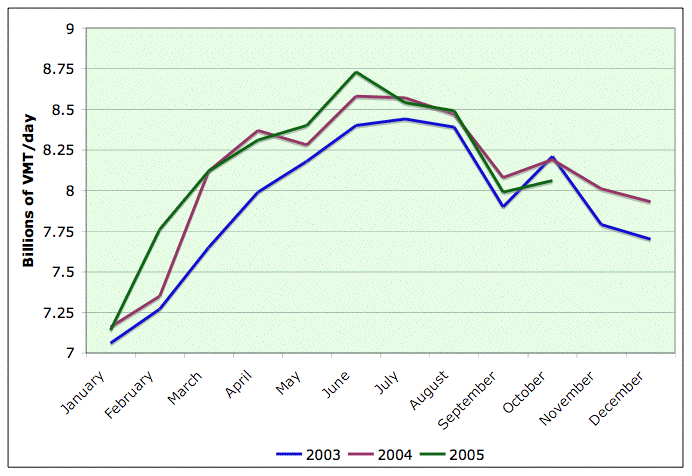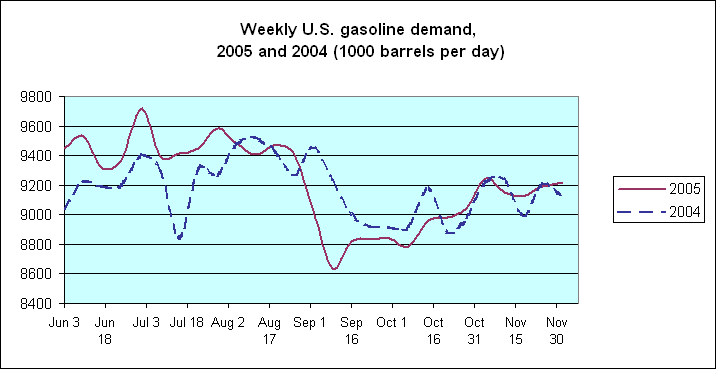More evidence that yes, rising prices change consumers’ behavior.
The Oil Drum notes that hourly traffic count data compiled by the Federal Highway Administration suggest that the August gas price increases held U.S. highway travel in August 2005 to the same level as in the corresponding month of 2004, while the September price spikes led to a significant drop in car travel:
 |
This is very similar to the conclusion drawn from the gasoline demand figures provided by the EIA:

All of this reinforces the conclusion that gasoline demand certainly does respond to the incentives of higher prices. The Oil Drum goes on to provide further evidence of this:
Finally, the most interesting question. Did the hurricanes mainly reduce VMT [vehicle miles traveled] by direct effects on travel in the affected region, or by price? Turns out to be price: absolutely no doubt about it. Louisiana and Mississippi saw a huge increase in VMT, but the rest of the country reduced VMT. The North East was hit hardest, and the West was affected the least.
Technorati Tags: gas prices,
gasoline prices, gasoline demand
“All of this reinforces the conclusion that gasoline demand certainly does respond to the incentives of higher prices.”
Just as we would expect to see; the law of demand in action. No need for price controls.
Gregorz:
The reaction to the price increases somewhat surprised me, especially among “conservative” Republicans.
It seems market conceptions have less effect than we might assume.
Higher gas prices through taxes always struck me as the way to conserve and encourage efficient vehicles, but environmentalists seemed to have opposed even when a handful of conservatives said they might go along in return for reductions in other taxes.
The issue is emotional and I suspect other elements of the economy involve similar irrationalities.
I think all across the spectrum people want to be victims to hold others accountable (thus environmentalists claim that it’s autro makers fault we don’t have 50 mpg 2 ton SUVs) and markets while appearing to be a simple balance for a number of situations are politically impossible because they involve taking responsibility, eg, citizenship.
Please note I’m more “liberal” than not and ablieve extensive government intervention can be justified in many things, but I believe active choice as well as passive “freedom from” is necessary to be truly free in this life.
And as I stated earlier the shunning of responibility is IMO as common on the right as the left. Look at Limpbowel and others who are constantly victims of victims.
I do think there is an approach that is probably necessary is certainly simplifying and which unites a fraction of individuals across the spectrum.
“The reaction to the price increases somewhat surprised me, especially among “conservative” Republicans.”
Conservatives are never surprised when the law of supply and demand works. They are, however, ammused by liberals who always argue that it won’t work this time, and who never seem to learn from their experience.
Yet another tid bit that shows it’s unlikley that there will be a hard landing when deman for oil outsrips supply.
Thanks for referencing my piece JDH.
To me the data reinforce that, yes, demand responds to price, but very inelastically. If you look at the gasoline prices at
http://tonto.eia.doe.gov/dnav/pet/hist/mg_tt_usw.htm
you can see that through August prices rose from around 2.30 to 2.60. Then they spiked to 3.11 in the first week of September and declined about 20 cents through September. So let’s say the increase from August to September was from average 2.50 to 3.00, a 20% increase in round numbers. That takes VMT (vehicle miles traveled) from flat over 2004 in August, to down 1.3% in September. -1.3/20 gives an elasticity of -0.065. But then we get a bit of a delayed effect in October which is down 1.6% – 1 month lagged elasticity of -0.08? Presumably, judging by JDH’s weekly gas demand graph, the effect is now washing out as gas demand is back up to level with last year, as it was in August. These kind of elasticities comport with my expectations from looking at past oil shocks (where I’ve estimated the price elasticity of VMT after subtracting out the long term trend effects due to GDP growth as being -0.07).
What was most interesting to me was to see the 4% -9% increases in VMT in Louisiana and Mississipi in the months post hurricane. Rebuilding is a powerful stimulant of driving it appears (and I would assume that means of economic activity also).
BTW I recently discovered that one can put a ‘width = “X%”‘ attribute in tags in HTML, which causes the browser to autoscale pictures to be X% of the width of the text, and improving the look of articles in varying widths of browser window significantly.
Stuart,
I live in South Louisiana, and am still living through the higher vehicle counts. Unfortunately, I think the higher VMT reflects the high degree of destruction in the state, rather than a higher level of economic activity. We had first responders, electrical repair crews etc camping outside churches in Baton Rouge and Lafayette and commuting 90 miles to New Orleans, St Bernard, etc to work. As busineses have started back up, employees are doing that drive every day..
Doug:
You may be right that it’s just very long commutes, not more economic activity in the form of rebuilding. The BEA only has state data through 2004, so we’ll have to wait and see. However, Florida had growth of 5.9% in gross state product from 2003 to 2004 (in which last year it was hit by four hurricanes). That placed it fifth in the nation for growth rate. It’s average growth rate from 1997-2003 was 3.8% (rank 11th in the nation). So one could make a case that the hurricane rebuilding helped GSP – certainly there’s no evidence it hurt. I realize this is only a single data point…
None of this is to deny that a lot of *wealth* — in the form of assets — must get destroyed by landfalling hurricanes, but it seems they don’t hurt economic activity as measured by GSP anyway. It seems to be kind of like poking an ant’s nest with a stick – the ants all begin frenetic activity to fix the damage.
The BEA regional data is at
http://www.bea.gov/bea/regional/gsp.htm
Stuart.
Oh – and the 2004 hurricane tracks are at:
http://www.nhc.noaa.gov/tracks/2004atl.gif
Stuart,
On the BEA website you linked there is a 12/20/05 news release which says:
Personal income fell 25 percent in disaster stricken Louisiana, the state hardest hit by Hurricanes Katrina and Rita in the third quarter; Mississippi and Alabama, which did not suffer as extensive destruction, grew 0.8 percent; and the rest of the country grew 1.1 percent….
I was down in Vermillion Parish Louisiana yesterday celebrating Christmas with my wifes family. Several of the big natural gas pipelines which make up the Henry Hub cross her family’s property.
What I see down there is a great deal of activity associated with getting the natural gas infrastructure online. At the same time, the towns are almost completely destroyed – most businesses are shut. The agriculture industry has been set back by salt water from the storm surge.
Most of the local schools are destroyed and no money exists to repair them. (One of the local towns is trying to get their high school featured on “extreme makeover” to get it repaired).
The residents who have jobs in the energy industry are the “haves” but I can’t help but believe the underlying chaos in their local communities will ultimately affect the productivity and capability of the industry.
Prof. Hamilton, I realize we have hijacked your topic a bit here – at least our discussion is sort of energy related. Hope its OK…
These are very interesting observations, Doug. Thanks for contributing them.
Doug:
I just arrived in New Orleans, so I’ll get to see for myself. It seems to me there’s two hypotheses consistent with the data point you cite. One is that while light damage stimulates regional economic activity, sufficiently heavy damage reduces it (long-term). The other possibility is that it takes a while for the rebuilding to swing fully into action (which seems to be dependent on government policy to some degree).
Hmmm. That last anonymous comment was me. You can read some subjective impressions of New Orleans here:
http://www.theoildrum.com/story/2005/12/28/21237/999
Isn’t a bit of a tautology to say that gasoline demand went down after Katrina? Production obviously went down, and since supply equals demand, demand simply had no choice at all except to fall (barring stuff like changes in inventories).
Demand Curves Are Not Vertical
Politicians who have tried to make a name for themselves by attacking price gougers commit several economic errors. One of the errors involves the implicit assumption that demand curves are vertical. They seem to believe that when prices go up, consume…